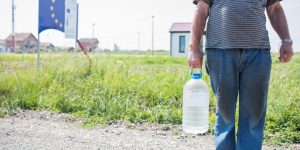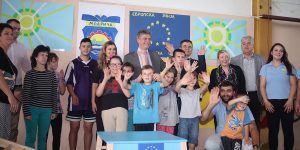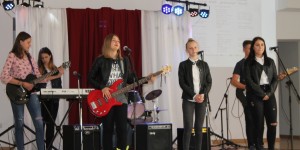Within the scope of “Local Integrated Development” (LID) project, the seeds of soybeans have been provided for 145 soybean producers from 5 municipalities and cities in Bosnia and Herzegovina (BiH): Bijeljina, Domaljevac-Šamac, Odžak, Orašje and Šamac, which will raise soybeans plantations on an area of 660 hectares, during this year’s agricultural season.
Support in soybean production is one of the project’s activities that aims to develop soybean production value chain, and establish and strengthen economically viable and environmentally and socially acceptable production of genetically non-modified soybean. Production of genetically non-modified soybeans has significant potential in BiH, and represents an excellent opportunity for local producers to diversify their production. In addition, the increase in soybean production areas in BiH will have a direct impact on the reduction of imports, while the domestic soybean oil producers, could increase the export of edible oil in the countries of the region and the European Union.
Within the project, selected beneficiaries will be provided with technical support as well as the ability to negotiate and sign cooperative agreements with companies that purchase soybeans and, in that way secure sale of their products to the known buyer and establish long-term business cooperation.
The Local Integrated Development Project is a three-year initiative (2016-2018) primarily financed by the European Union (EU) and implemented by the United Nations Development Programme in Bosnia and Herzegovina (UNDP in BiH), in cooperation with the BiH Ministry of Human Rights and Refugees, Ministry of Development, Entrepreneurship and Crafts of the Federation of BiH, Ministry of Administration and Local Self-Government of RS and two Associations of Cities and Municipalities. Project is implemented in 21 units of local self-governance in BiH: Banja Luka, Bijeljina, Čelinac, Doboj, Foča, Goražde, Gradiška, Konjic, Maglaj, Modriča, Mostar, Novi Grad, Odžak, Orašje, Prijedor, Srebrenik, Šamac, Tuzla, Vareš, Žepče and Živinice.
The overall objective of the Project is to raise the standards of living and social cohesion in Bosnia and Herzegovina through inclusive sustainable socio-economic development. Within the component for economic recovery, LID project will directly support the private sector and potential investors in order to increase an overall economic activity in local communities, ensure economic growth through productive value chains and to create new jobs and income. The project also provides assistance for the long-term unemployed and socially excluded categories of the population, especially returnees, internally displaced persons and long-term unemployed persons.



